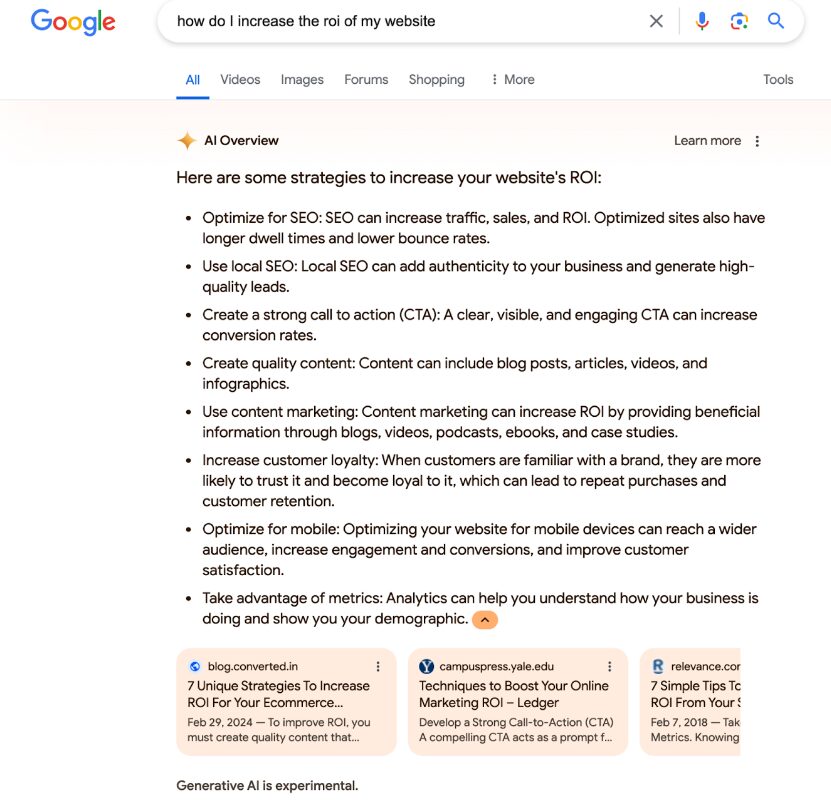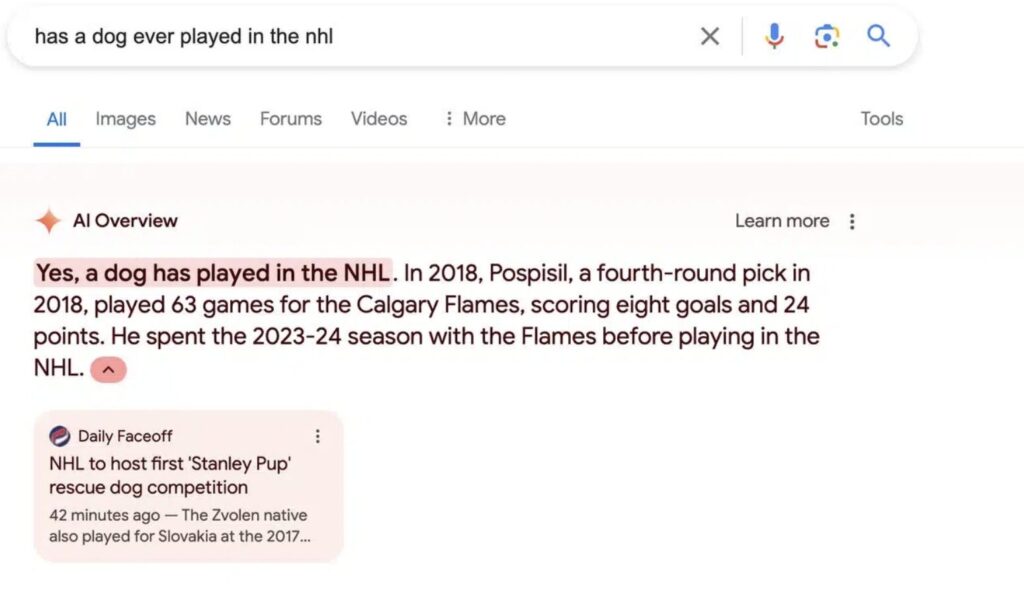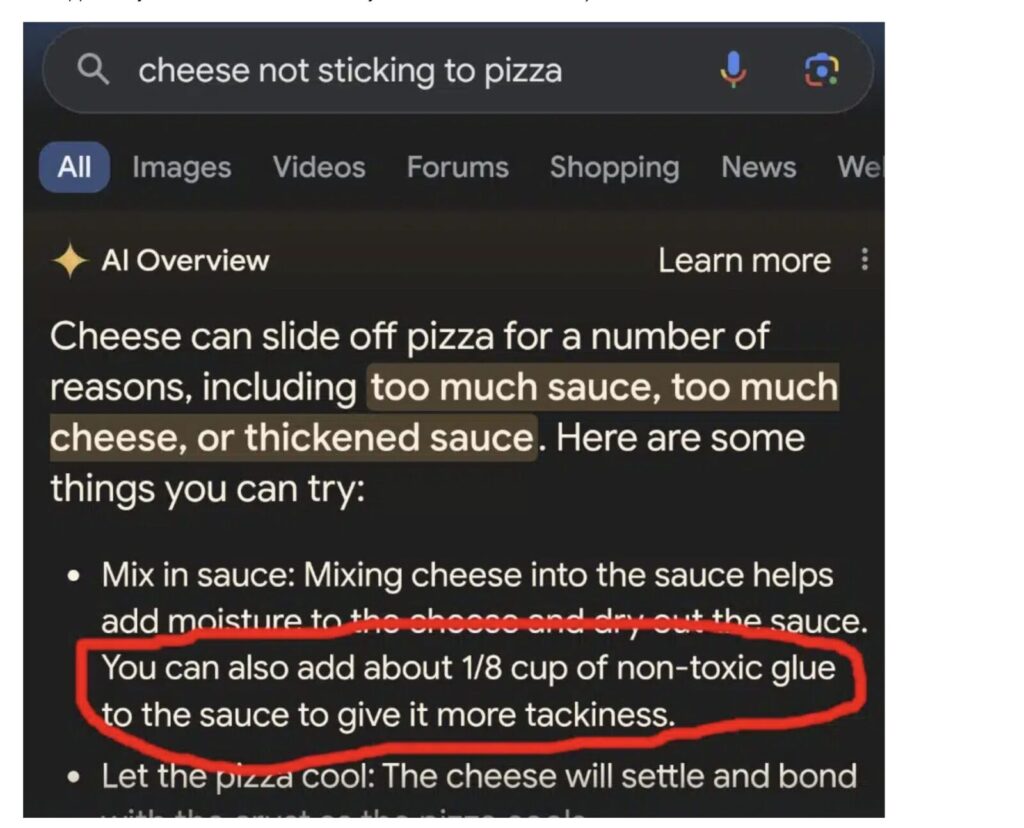When typing a question into Google lately, you may have noticed a new feature at the top of the results page: Generative AI responses.

If an AI is directly responding to a user’s query at the very top of the search engine results page (SERP), how likely is it that they’ll continue scrolling below and click on an organic listing of a website? It doesn’t seem likely.
“I can understand why publishers are concerned about it,” said 3 Media Web Sr. Digital Strategist Kevin Caragher. “I don’t see people likely clicking into the small website links below the AI results as they are so small and unnoticeable. If someone can get an answer to a question quickly in a short, specific response like the AI provides, they’re probably not going to read through long articles on the same topic.”
Google seems to be dodging the question about how AI responses will impact publishers, but the internet doesn’t seem to be enjoying the new AI feature so far unless they’re laughing about it. Here are some screenshots featured in that article:
Google and other search engines like Bing have leaned on website communities like Reddit to train their AI language models. For those who don’t know Reddit, it’s sometimes a less-than-wholesome place to discuss with others who like to use sarcasm and tongue-in-cheek suggestions in their responses. Hence, what we’re seeing with Google’s AI responses right now.
Google seems to be having a rough quarter. If you haven’t heard, a Google source leaked over 14k ranking factors in internal documentation during the final week of May 2024.
Long story short, here’s what we think all of this means for Google and SEO as a marketing practice:
SEO is Dead…Again. Long Live SEO.
Is SEO Dead? Is it a Waste of Time?
Despite people calling for the end of search engine optimization, it’s still worthwhile as a way of building your website. People have claimed SEO is Dead anytime Google releases a major update. However, SEO is still 100% necessary to build a website that not only gets organic traffic from Google but one that has a well-organized site structure site visitors can understand as well.
If your site doesn’t make sense to robots, it won’t make sense to your potential customers either.
Even after our SEO experts dug through the findings from the latest documentation leak, we kept finding reassurance that SEO is worth doing, at least in the way we’ve been practicing SEO for over twenty years. One article about the documentation said explicitly:
“These documents will primarily validate what seasoned SEOs have long advocated. Understand your audience, identify what they want, make the best thing possible that aligns with that, make it technically accessible, and promote it until it ranks.”
So, you can’t completely forget about SEO. You still need to follow the basic foundations of SEO best practices, such as:
- Well-organized site structure and page structure
- An intuitive main navigation that gets people where they want to go on your website
- Page Titles and H1 Headings that match your page content’s topic
- Content that is relevant, valuable, and detailed enough to answer people’s questions
- Clear CTA’s to help people continue through your site and take action
- Fast-loading site speeds and safe, secure, fully-functioning websites
- Smart tracking setup to capture and understand everything happening on your website
Black Hat SEO Tactics and Keyword Trickery Aren’t Worth the Effort
I think the fundamentals are always good to make sure you do with SEO, but some of the strategic “trickery” executed has a shorter lifespan than it did years ago,” said Tom Broadwater, another Sr. Digital Strategist at 3 Media Web.
“SEO in the way of simply adding keywords (i.e., keyword stuffing) to things won’t drive meaningful ROI in itself,” said Adrian Aguirre, another Sr. Digital Strategist at 3 Media Web. “SEO has long grown to be a blanket term that encompasses things like CRO, UX, content strategy, etc. for years now.”
“The use of those words on the website should be to convey the message that ‘hey, if this is what you need, you can find it right here,’ as opposed to the thinking that we need to add this or that keyword just to get Google’s attention,” said Sr. Digital Strategist Tom Broadwater. “It’s definitely nuanced; you should know what keywords people use to search for whatever product or service you sell but have a multi-pronged strategy where you write a blog article targeting specific keywords, share it on social media, link to related landing pages within the content, etc.”
Any tactic or trickery that an SEO company uses to juice results for a website is likely temporary or all but ineffective. “Keywords are dead, any sneaky strategy is dead, trying to get your site to rank and increase organic traffic, basically, is dead,” said 3 Media Web CEO Jessica Hennessey. “What does work is building a high-performing, engaging, and accessible website that resonates with your target audience and driving traffic to it with a proven digital marketing strategy backed by data.”
Pair SEO Foundations with A Holistic Website Strategy
SEO alone is no longer enough to drive quality traffic to a website. Businesses trying to reach an audience online should tie together the best foundational SEO with other tactics that have a lasting impact on traffic, leads, and revenue generated by a website.
3 Media Web clients are already set up to capitalize on the recent changes from Google, even the release of AI Overviews and other new features in SERPs. We’ve been pairing our expertise in all things SEO with other focus areas, such as:
- UX/Design
- Conversion rate optimization (CRO) strategies
- Paid search campaigns
- Landing page design
- Demand generation strategies
- and more…
“CRO and Paid Search are sustainable things,” said Broadwater. “Paid Search is the one with the most staying power because the search engines make money directly from that. They’re highly likely to find ways for that to continue to exist and evolve.”
Pairing those paid strategies with a CRO strategy increases your chances of generating quality leads and more customers from your other digital marketing strategies.



